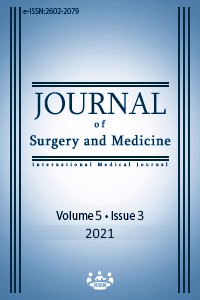Views of Turkish healthcare professionals and their hesitations about the COVID-19 vaccine
Keywords:
COVID-19 Vaccines, Healthcare Workers, Vaccine HesitationAbstract
Background/Aim: Views of health sector workers on the safety and efficacy of a vaccine, which forms the basis of a vaccination program, can affect both the public perception of the vaccine and its implementation in the community. Accordingly, this study aimed to acknowledge potential hesitations of healthcare specialists and their views on the acceptability of a vaccine before initiating a vaccine policy program. Methods: A total of 442 healthcare professionals participated in this study by answering a 24-question survey online from their social media accounts. We analyzed the data and present the descriptive statistics with mean and standard deviation values. We performed t-test analysis and analysis of variance to examine physicians’ attitudes toward vaccines and the coronavirus disease 2019 (COVID-19) infection, based on their demographic, and other characteristics. Tamhane and Sidak paired comparison tests were conducted to determine differences in groups after variance analysis. Results: Of the healthcare professionals, 55.9% agreed that the COVID-19 vaccine would end the pandemic. A total of 72.6% of healthcare workers reported that they were planning to get vaccinated with the free COVID-19 vaccine, which is to be distributed by the Ministry. The biggest drawback of the vaccination was its unknown long-term side effects. We noted a difference in the attitude toward vaccines in those older than 41 years and younger than 30 years of age. We also found a significant and positive relationship between the attitudes of the participants toward the measures taken regarding the COVID-19 infection and their attitudes toward the vaccine. Conclusion: Hesitation about a vaccine during a pandemic is a major obstacle to implementing vaccination campaigns. To continue the benefits of vaccination programs, understanding and addressing these hesitations held by healthcare professionals are crucial to the successful implementation of a vaccination program.
Downloads
References
T.C. Sağlık Bakanlığı [Internet]. [cited 2020 Dec 28]. Available from: https://www.saglik.gov.tr/
Türkiye Cumhuriyeti Cumhurbaşkanlığı Dijital Dönüşüm Ofisi - Anasayfa [Internet]. [cited 2020 Dec 29]. Available from: https://corona.cbddo.gov.tr/
Üzüm Ö, Eliaçık K, Hortu Örsdemir H, Karadağ Öncel E. Factors affecting the immunization approaches of caregivers: An example of a teaching and research hospital. Cocuk Enfeksiyon Derg [Internet]. 2019 [cited 2020 Dec 22];13(3):144–9. Available from: www.cocukenfeksiyon.org
Wang J, Jing R, Lai X, Zhang H, Lyu Y, Knoll MD, et al.. Acceptance of covid-19 vaccination during the covid-19 pandemic in china. Vaccines [Internet]. 2020 Sep 1 [cited 2020 Dec 28];8(3):1–14. Available from: https://pubmed.ncbi.nlm.nih.gov/32867224/
Yiğit T. Aşı Karşıtlığı ve Fikri Gelişimi. Int J Soc Humanit Sci Res [Internet]. 2020 [cited 2020 Dec 22];7(53):1244–61. Available from: http://dx.doi.org/10.26450/jshsr.1881
Grech V, Gauci C, Agius S. Vaccine hesitancy among Maltese healthcare workers toward influenza and novel COVID-19 vaccination. Early Hum Dev. 2020 Oct 1;105213.
Kabamba Nzaji M, Kabamba Ngombe L, Ngoie Mwamba G, Banza Ndala DB, Mbidi Miema J, Luhata Lungoyo C, et al. Acceptability of Vaccination Against COVID-19 Among Healthcare Workers in the Democratic Republic of the Congo. Pragmatic Obs Res [Internet]. 2020 Oct [cited 2020 Dec 29];Volume 11:103–9. Available from: /pmc/articles/PMC7605960/?report=abstract
Gadoth A, Halbrook M, Martin-Blais R, Gray AN, Tobin NH, Ferbas KG, et al. Assessment of COVID-19 vaccine acceptance among healthcare workers in Los Angeles. medRxiv [Internet]. 2020 Nov 19 [cited 2021 Jan 1];2020.11.18.20234468. Available from: https://doi.org/10.1101/2020.11.18.20234468
Poustchi H, Darvishian M, Mohammadi Z, Shayanrad A, Delavari A, Bahadorimonfared A, et al.SARS-CoV-2 antibody seroprevalence in the general population and high-risk occupational groups across 18 cities in Iran: a population-based cross-sectional study. Lancet Infect Dis [Internet]. 2020 Dec [cited 2021 Jan 5];0(0). Available from: https://linkinghub.elsevier.com/retrieve/pii/S1473309920308586
Galanis PA, Vraka I, Fragkou D, Bilali A, Kaitelidou D. Intention of health care workers to accept COVID-19 vaccination and related factors: a systematic review and meta-analysis. medRxiv [Internet]. 2020 Dec 11 [cited 2021 Jan 1];2020.12.08.20246041. Available from: https://doi.org/10.1101/2020.12.08.20246041
Geoghegan S, O’Callaghan KP, Offit PA. Vaccine Safety: Myths and Misinformation [Internet]. Vol. 11, Frontiers in Microbiology. Frontiers Media S.A.; 2020 [cited 2021 Jan 2]. p. 372. Available from: https://www.frontiersin.org/article/10.3389/fmicb.2020.00372/full
Kutlu Hh, Altindiş M. Anti-Vaccination. Flora J Infect Dis Clin Microbiol. 2018;23(2):47–58.
Karafillakis E, Larson HJ. The benefit of the doubt or doubts over benefits? A systematic literature review of perceived risks of vaccines in European populations. Vol. 35, Vaccine. Elsevier Ltd; 2017. p. 4840–50.
Dubé E, Laberge C, Guay M, Bramadat P, Roy R, Bettinger J. Vaccine hesitancy: An overview [Internet]. Vol. 9, Human Vaccines and Immunotherapeutics. Taylor & Francis; 2013 [cited 2021 Jan 2]. p. 1763–73. Available from: www.landesbioscience.com
Yapıcı G, Yeniocak Tunç A. Ülkemizde Aşı ile Korunabilen Hastalıklara Yönelik Yürütülen Eliminasyon ve Eradikasyon Programlarının Değerlendirilmesi. Mersin Üniversitesi Tıp Fakültesi Lokman Hekim Tıp Tarihi ve Folk Tıp Derg [Internet]. 2019 May 30 [cited 2020 Dec 22];9(2):171–83. Available from: http://dergipark.org.tr/doi/10.31020/mutftd.552075
Smith J, Lipsitch M, Almond JW. Vaccine production, distribution, access, and uptake. Vol. 378, The Lancet. 2011. p. 428–38.
Downloads
- 665 800
Published
Issue
Section
How to Cite
License
Copyright (c) 2021 Sadik Kükrer, Ayfer Pepekal Kükrer, Sefa Arlıer, Simten Genç
This work is licensed under a Creative Commons Attribution-NonCommercial-NoDerivatives 4.0 International License.
















